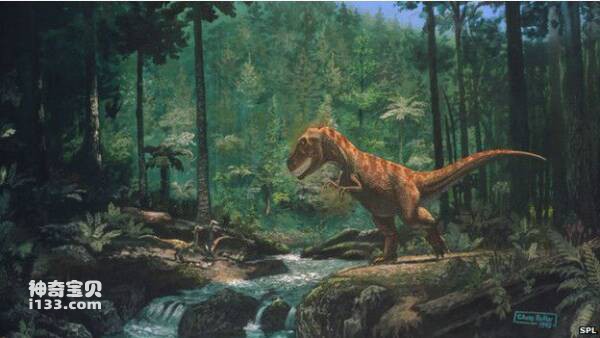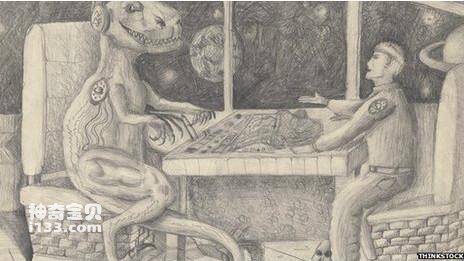The latest research claims that the dinosaurs became extinct after a meteorite hit the earth 65 million years ago in the late Cretaceous period entirely due to "bad luck." New research believes that if the meteorite impact on the earth in the late Cretaceous period had been earlier or delayed by millions of years, the dinosaurs might not have become extinct. Some British scientists pointed out that when the meteorite hit the ground, the dinosaur ecological environment was at its most "vulnerable" period, making the extinction of the dinosaurs almost inevitable.

Dr Steve Brusatte from the University of Edinburgh in Scotland said that before the meteorite hit the Earth, the Earth was already experiencing sea level rise and intense volcanic activity due to climate warming, and many species were already on the verge of extinction.
He believes that if the meteorite hit the earth millions of years earlier or later, the dinosaurs might still have a chance to avoid extinction, so the dinosaurs could be described as having "very bad luck."
The above-mentioned research results, involving a total of 11 senior dinosaur experts from the UK, the United States and Canada, have been published in the latest issue of the biological academic journal "Biological Reviews".
Doomed
Dr. Brusatte told the BBC reporter about the dinosaur extinction event: "It was a perfect storm - almost all bad luck came together, and it happened at the time when the dinosaur ecological environment was at its most vulnerable. "
Previous evidence showed that many dinosaur species had begun to die out even before the meteor hit the ground; therefore, some scientists questioned whether the dinosaurs would have gradually and naturally become extinct if the meteorite had not hit the ground.
However, more experts believe that the warming of the Earth's atmosphere, rising sea levels, and increased volcanic activity have indeed caused some herbivorous dinosaurs to become extinct. However, there is no sign that the dinosaurs faced total extinction before the meteorite hit the ground.
New research believes that if a meteorite had hit the Earth a few million years earlier or a few million years later, most dinosaurs might have survived and multiplied, and might even have ruled the Earth to this day.

Sci-fi drawings show dinosaurs coexisting with humans and also possessing intelligence and language
"Five million years before the meteorite hit the Earth, the ecological and environmental conditions were much better. There were more types of animals and plants, and the food chain was very solid. It was difficult for species to become extinct due to a natural disaster," Dr. Brusatte said.
"Similarly, if the meteorite hits a few million years later, dinosaurs and the ecological environment will have the opportunity to evolve and recover to be more diverse."
He pointed out that dinosaurs have survived and evolved on the earth for 160 million years, during which there were many huge natural and extraterrestrial disasters. However, dinosaurs have always overcome difficulties and have not faced survival crises.
In other words, if the time when the meteor hit the earth had changed, dinosaurs might still be "ruling" the earth today.
Gospel for humanity
Of course, scientists also promptly pointed out that although the meteorite hitting the earth was a catastrophe for the dinosaurs, without the mass extinction of the dinosaurs, mammals, including later humans, might have disappeared from the earth, because they would have been impossible to interact with. If dinosaurs competed, it would be impossible for them to reproduce and evolve to this day.
“If the dinosaurs hadn’t gone extinct, there wouldn’t be us,” Dr. Brusatte said with a laugh. "Because mammals simply wouldn't have had the chance to evolve and thrive in a world dominated by dinosaurs."
Many people may have thought about a question in their minds, that is, if dinosaurs really evolved to this day, would they also become intelligent animals and possibly have language?
"It's possible!" said Dr. Brusatte. "In the natural evolution process of natural selection, any outcome is possible. It is definitely possible for dinosaurs to evolve into intelligent life."
On this point, Simon Conway Morris, a professor at the University of Cambridge, also theoretically agrees with Brusatte; however, he does not believe that dinosaurs will continue to dominate the earth to this day.
Doubtful voices
Professor Conway Morris believes that even if there is no mass extinction caused by a meteorite impact, dinosaurs will still gradually die out in natural evolution like any other species.
He believes that in a world dominated by dinosaurs, other species were under tremendous pressure to survive and were more likely to evolve intelligence and the ability to make and use tools first.
"From that moment on, the dinosaurs were doomed," said Professor Conway Morris.
Not all scientists support Dr. Brusatte's theory. Many people pointed out that although Brusatte's new theory is reasonable, the research results do not convincingly prove that if the meteorite hits the earth earlier or later, the dinosaurs will definitely continue to survive.
Dr. Butler from the University of Birmingham said: "We can't travel back in time and go back millions of years to prove whether a meteorite hitting Earth earlier or later would still have caused a mass extinction, but we agree that the living environment for dinosaurs was indeed not good at that time."
Dr. Barrett of the British Museum of Natural History in London also said that it is difficult to say that the dinosaurs would not have become extinct without the meteorite hitting the ground, but the new study at least proves one thing, that is, the direct cause of the dinosaur extinction was definitely the meteorite hitting the ground and not the climate change at that time.
animal tags:
We created this article in conjunction with AI technology, then made sure it was fact-checked and edited by a Animals Top editor.